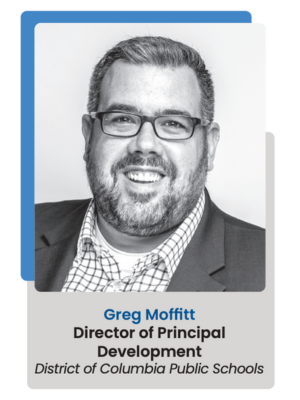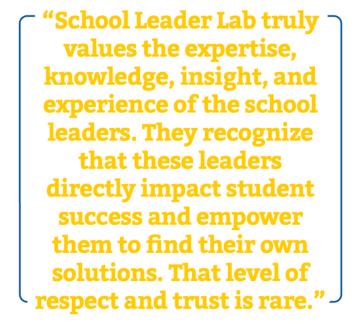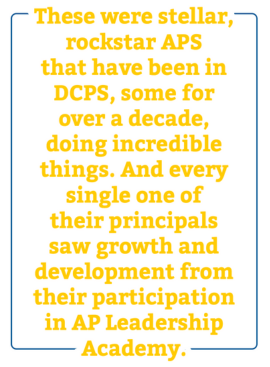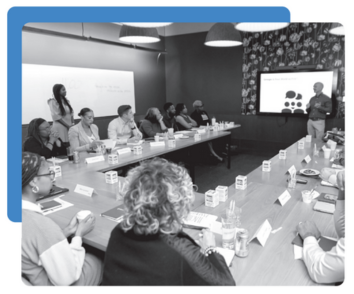 Greg Moffitt, Director of Principal Development at the District of Columbia Public Schools, illustrates how DCPS’ partnership with School Leader Lab helps assistant principals stay in their roles longer.
Greg Moffitt, Director of Principal Development at the District of Columbia Public Schools, illustrates how DCPS’ partnership with School Leader Lab helps assistant principals stay in their roles longer.“I never imagined I would go into education. I had no dreams of becoming a teacher. I had no thoughts of becoming a principal,” states Greg Moffitt, the Director of Principal Development at the District of Columbia Public Schools (DCPS). “I thought I would go to college, study politics and government, return to my hometown, run for mayor, and do all the political stuff. But the political science course was overenrolled.”
 This chance occurrence had a resounding effect on Greg’s future: “I needed to take another course, and my freshman advisor suggested, ‘Public policy is similar to political science, and there’s a course that fits perfectly into your schedule: Public Policy and Education.’” In this course, Greg observed schools to see how district-wide changes were implemented in practice.
This chance occurrence had a resounding effect on Greg’s future: “I needed to take another course, and my freshman advisor suggested, ‘Public policy is similar to political science, and there’s a course that fits perfectly into your schedule: Public Policy and Education.’” In this course, Greg observed schools to see how district-wide changes were implemented in practice.
“I went and saw one class, and the instruction was unbelievable. Ninth-graders were reading Romeo and Juliet, out of their seats, acting, and debating. It was amazing. It was also at one of the selective schools in the city. The next day, I visited another nearby high school and had a completely different experience. Students were watching the Romeo and Juliet movie. I thought perhaps their unit was over, so I asked the teacher to share more. She explained that her students couldn’t read Romeo and Juliet, so they watched the movie and took notes to keep up with the pacing guide. I thought, ‘How could this be? This isn’t right.’ I told my professor, ‘We need to change this.’ He replied, ‘Greg, if you want to change schools, you’d better work in a school.’ And I’ve been working in schools ever since.
Greg went on to earn his Master’s degree, teach middle school for several years, and then become an elementary school assistant principal and principal. “When my wife landed a job in DC, I thought I could take what I had learned as a principal, along with all the mistakes I had made, and use that experience to help other school leaders.”
 What drew Greg to DCPS were their stated values. “As a former school leader, it was the organization’s commitment to becoming a whole child, antiracist school district that really drew me to DCPS. When I got to DC, I was blown away by the work that school leaders were doing in the city despite incredible challenges. It is a privilege to support these leaders, highlight the incredible things they’re doing, elevate their voices, and collaborate with them as a thought partner.”
What drew Greg to DCPS were their stated values. “As a former school leader, it was the organization’s commitment to becoming a whole child, antiracist school district that really drew me to DCPS. When I got to DC, I was blown away by the work that school leaders were doing in the city despite incredible challenges. It is a privilege to support these leaders, highlight the incredible things they’re doing, elevate their voices, and collaborate with them as a thought partner.”
As Director of Principal Development, Greg supports the 115 principals leading DCPS’s 117 schools, along with 200 assistant principals (APs) and nearly 100 aspiring APs, all of whom together impact 51,000 students. “The most rewarding part of my work is coaching new school leaders, providing them with a professional learning cohort, pairing them with mentor principals, and ensuring their first few years in the role are a success.”
While DCPS was implementing various strategies to develop equity- centered leaders, there was a missing piece in school leadership development. “We had programs for APs aspiring to become principals and programs to support first-year APs, but we needed to address a gap for APs who were already proficient in their roles—APs who want to grow, learn, and have a greater impact on students and their colleagues. So, we collaborated with School Leader Lab to create the AP Leadership Academy (APLA).”
Greg continues: “Each participant in the AP Leadership Academy designed a leadership action project to work on throughout the year. Every APLA session provided them with new perspectives to enhance their work. The action projects had to align with their comprehensive school plans, which in turn needed to align with the DCPS strategic plan. APLA created a space for 19 DCPS assistant principals to come together, identify real challenges, and develop solutions with the support of School Leader Lab and their fellow APs.”
 The impact of the AP Leadership Academy was remarkable. “100% of the participants reported that the program supported their growth and development as school leaders, and they felt this way about every single session. What’s even more impactful is that 100% of their principals observed how the program influenced the growth and development of these 19 APs. These were stellar, rockstar APs that have been in DCPS, some for over a decade, doing incredible things. And every single one of their principals saw growth and development from their participation in the program. I believe supervisors recognized the program’s value not only because the APs worked on impactful, aligned leadership action projects but also due to the way the APs approached their roles and thought differently about their work.”
The impact of the AP Leadership Academy was remarkable. “100% of the participants reported that the program supported their growth and development as school leaders, and they felt this way about every single session. What’s even more impactful is that 100% of their principals observed how the program influenced the growth and development of these 19 APs. These were stellar, rockstar APs that have been in DCPS, some for over a decade, doing incredible things. And every single one of their principals saw growth and development from their participation in the program. I believe supervisors recognized the program’s value not only because the APs worked on impactful, aligned leadership action projects but also due to the way the APs approached their roles and thought differently about their work.”
Greg notes that the most significant impact of the AP Leadership Academy was the empowerment it provided to the assistant principals. “The greatest gift School Leader Lab gave our assistant principals was the opportunity to realize that they have the knowledge and skills to address the problems they face. School Leader Lab provided valuable frameworks and new ideas, but they didn’t dictate solutions. Instead, they empowered the APs to find their own solutions. APLA also re-energized them. At the start of the program, some participants felt disheartened and frustrated by recurring challenges. Now, these same APs have a renewed sense of agency and are eager to tackle these challenges again. This renewed energy and empowerment extend to their staff, who also feel more capable of creating better conditions for students.”
With APLA 2024 kicking off this fall, Greg reflects on the ongoing partnership between School Leader Lab and DCPS: “School Leader Lab truly values the expertise, knowledge, insight, and experience of the school leaders. They recognize that these leaders directly impact student success and empower them to find their own solutions. That level of respect and trust is rare.”